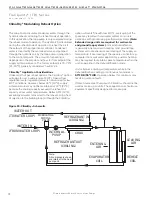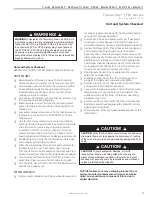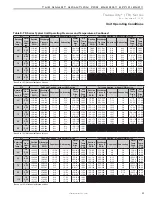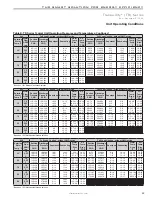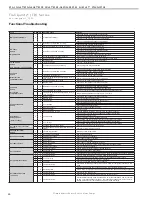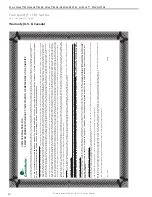
84
C L I M A T E M A S T E R W A T E R - S O U R C E H E A T P U M P S
Tr a n q u i l i t y
®
( T R ) S e r i e s
R e v. : N o v e m b e r 2 , 2 0 2 0
C l i m a t e M a s t e r Wa t e r - S o u r c e H e a t P u m p s
Water Coil Maintenance -
(Direct ground water
applications only) If the system is installed in an area with
a known high mineral content (125 P.P.M. or greater) in
the water, it is best to establish a periodic maintenance
schedule with the owner so the coil can be checked
regularly. Consult the well water applications section
of this manual for a more detailed water coil material
selection. Should periodic coil cleaning be necessary, use
standard coil cleaning procedures, which are compatible
with the heat exchanger material and copper water
lines. Generally, the more water flowing through the unit,
the less chance for scaling. Therefore, 1.5 gpm per ton
[1.6 l/m per kW] is recommended as a minimum flow.
Minimum flow rate for entering water temperatures below
50°F [10°C] is 2.0 gpm per ton [2.2 l/m per kW].
Water Coil Maintenance -
(All other water loop
applications) Generally water coil maintenance is not
needed for closed loop systems. However, if the piping
is known to have high dirt or debris content, it is best
to establish a periodic maintenance schedule with the
owner so the water coil can be checked regularly. Dirty
installations are typically the result of deterioration of iron
or galvanized piping or components in the system. Open
cooling towers requiring heavy chemical treatment and
mineral buildup through water use can also contribute
to higher maintenance. Should periodic coil cleaning be
necessary, use standard coil cleaning procedures, which
are compatible with both the heat exchanger material
and copper water lines. Generally, the more water flowing
through the unit, the less chance for scaling. However,
flow rates over 3 gpm per ton (3.9 l/m per kW) can
produce water (or debris) velocities that can erode the
heat exchanger wall and ultimately produce leaks.
Hot Water Generator Coils -
See water coil maintenance
for ground water units. If the potable water is hard or
not chemically softened, the high temperatures of the
desuperheater will tend to scale even quicker than the
water coil and may need more frequent inspections.
In areas with extremely hard water, a HWG is not
recommended.
Filters -
Filters must be clean to obtain maximum
performance. Filters should be inspected every month
under normal operating conditions and be replaced when
necessary. Units should never be operated without a filter.
Washable, high efficiency, electrostatic filters, when dirty,
can exhibit a very high pressure drop for the fan motor
and reduce air flow, resulting in poor performance. It is
especially important to provide consistent washing of
these filters (in the opposite direction of the normal air
flow) once per month using a high pressure wash similar
to those found at self-serve car washes.
Condensate Drain -
In areas where airborne bacteria
may produce a “slimy” substance in the drain pan, it may
be necessary to treat the drain pan chemically with an
algaecide approximately every three months to minimize
the problem. The condensate pan may also need to be
cleaned periodically to ensure indoor air quality. The
condensate drain can pick up lint and dirt, especially with
dirty filters. Inspect the drain twice a year to avoid the
possibility of plugging and eventual overflow.
Compressor -
Conduct annual amperage checks to
ensure that amp draw is no more than 10% greater than
indicated on the serial plate data.
Unit Operating Conditions
Table 9: Water Temperature Change Through Heat Exchanger
Water Flow, gpm [l/m]
Rise, Cooling
°F, [°C]
Drop, Heating
°F, [°C]
For Closed Loop: Ground Source
or Closed Loop Systems at 3 gpm
per ton [3.2 l/m per kW]
9 - 12
[5 - 6.7]
4 - 8
[2.2 - 4.4]
For Open Loop: Ground Water
Systems at 1.5 gpm per ton
[1.6 l/m per kW]
20 - 26
[11.1 - 14.4]
10 - 17
[5.6 - 9.4]
PREVENTIVE MAINTENANCE
Содержание Tranquility TR Series
Страница 2: ......



